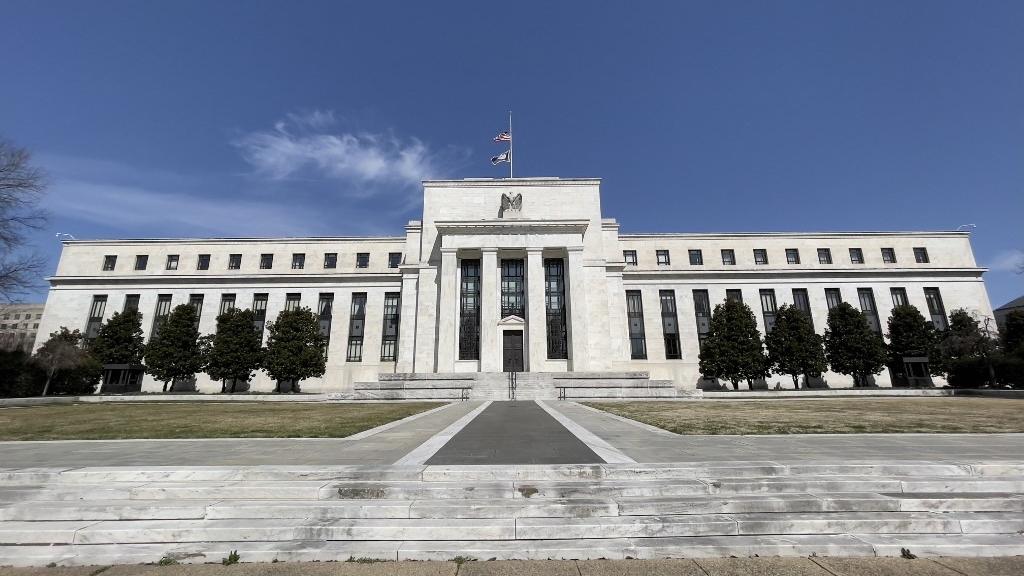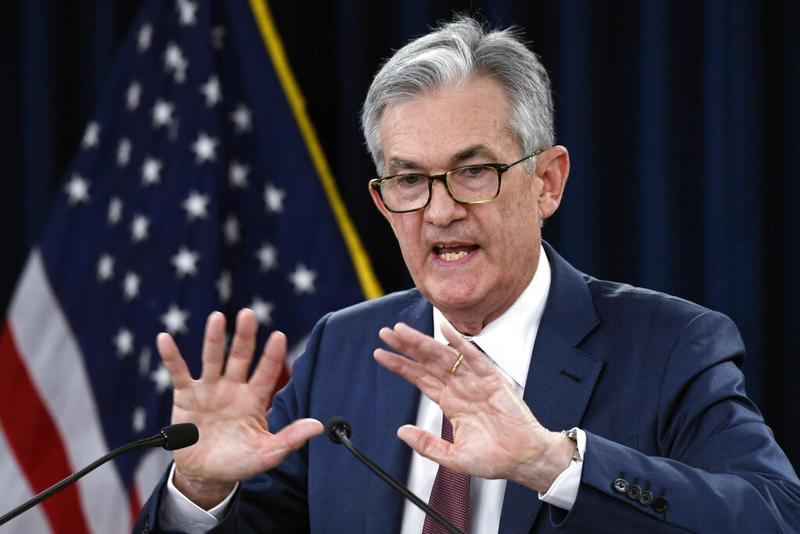 The Federal Reserve building is seen on March 19, 2021 in Washington, DC. (DANIEL SLIM / AFP)
The Federal Reserve building is seen on March 19, 2021 in Washington, DC. (DANIEL SLIM / AFP)
WASHINGTON - Surging inflation in the United States has spurred the Federal Reserve to signal plans to raise interest rates more aggressively than previously expected, and that in turn could spark a sharp sell-off in US stocks and precipitate a new recession, economists have warned.
Inflation is "not under control yet" and the US economy is "tipping into a slowdown," Arthur Laffer, an economist for former US President Ronald Reagan, told Fox Business News on Monday, arguing that a recession in 2023 is possible.
"We don't have any basics coming in that could really do a good job; tax cuts, spending restraint, sound money, all of that is missing, so I am quite concerned about the next 12 months for the US economy," he said.
Laffer made the comments after the US Commerce Department reported last week that the personal consumption expenditure price index, the Fed's preferred inflation measure, jumped 5.8 percent in December 2021 from a year ago, the fastest annual pace since mid-1982.
READ MORE: US national debt surpasses $30t as Fed prepares to raise rates
A separate report from the US Labor Department also showed that the consumer price index rose 7 percent in last December from a year earlier, the fastest clip since June 1982, well above the Fed's inflation target of 2 percent.
Following a Fed policy meeting last week, the central bank signaled that it is ready to begin a series of interest-rate hikes in March to combat surging inflation, as it exits from the ultra-loose monetary policy enacted at the start of the COVID-19 pandemic.
Market expectations have shifted after the Fed meeting, with investors now expecting the Fed to raise interest rates five times this year, while Fed officials in December 2021 projected only three rate hikes for the year.
‘JUST THE BEGINNING’
US stocks have dropped on the news of coming interest rate hikes, and some experts believe this is just the beginning, arguing that the US stock market could take a much more significant nosedive, even sparking a looming recession.
My expectation is that we are only at the beginning of a painful equity market adjustment and this sell-off, which will affect all sectors of the stock market, has a long way to go.
Desmond Lachman, Resident fellow, American Enterprise Institute
Heightening the chances of such a scenario is that inflation is running at a forty-year high, amid bubbles in both the US equity and housing markets, Desmond Lachman, a resident fellow at the American Enterprise Institute, told Xinhua.
The equity bubble is underlined by the fact that equity valuations at the start of the year were around double of their long-term average, while housing prices, even in inflation-adjusted terms, are above their 2006 levels before the last US housing bust, Lachman explained.
Once the Fed starts raising interest rates in earnest to get the inflation genie back into the bottle, US equity prices could fall at least another 20 percent from their current levels, Lachman said.
That is likely to precipitate a recession which will be more severe than the average US economic recession, but not necessarily as severe as the 2008-2009 economic meltdown, he said.
The shift in Fed policy has posed a major problem for the equity market, because those high valuations have been premised on the assumption that low interest rates will last forever.
Now markets are expecting the Fed to begin raising rates soon from the current record-low level of near zero, and have already seen a major sell-off in US equities.
The S&P 500 index fell 5.3 percent in January, its worst monthly performance since the pandemic took hold in March 2020 and biggest January decline since 2009.
ALSO READ: Fed's mad scramble to control inflation
"My expectation is that we are only at the beginning of a painful equity market adjustment and this sell-off, which will affect all sectors of the stock market, has a long way to go," Lachman said.
 Federal Reserve Chairman Jerome Powell speaks during a news conference in Washington, Oct. 30, 2019. (SUSAN WALSH / AP)
Federal Reserve Chairman Jerome Powell speaks during a news conference in Washington, Oct. 30, 2019. (SUSAN WALSH / AP)
MORE VIEWS
Former US Treasury Secretary Larry Summers has also warned that there have been few, if any, instances in which US inflation was successfully stabilized without recession.
Other analysts, however, believe the Fed does not have the backbone to raise interest rates to the point that it triggers a recession.
Wall Street economists have split over how many times the Fed will act to bring inflation down, penciling in as many as seven hikes this year as well as the risk that officials lift rates by 50 basis points, the first increase of that magnitude since 2000.
None of six Fed officials speaking so far this week, however, backed the idea of a half-point rate increase in March, and the consensus is a 25 basis points increase, according to Bloomberg.
"They don't want to look panicked or rushed. You don't want to be the driver of unnecessary volatility" in markets, Julia Coronado, founder of the research firm MacroPolicy Perspectives, was quoted as saying by Bloomberg.
Kyra Colson, an office worker in her 40s in the Washington D.C. area, told Xinhua she had experienced the long and drawn-out recession of 2007-2008 that spurred a years-long period of high unemployment and snail's-pace growth.
Colson added that she hopes such a downturn does not occur again.
That recession was characterized by long-term unemployment and new college graduates who could not find decent jobs for several years after graduation.
Still, while the current inflation rate is the fastest that the country has experienced in the past 40 years, it has yet to reach the double-digit levels of the 1970s, Lachman said.


